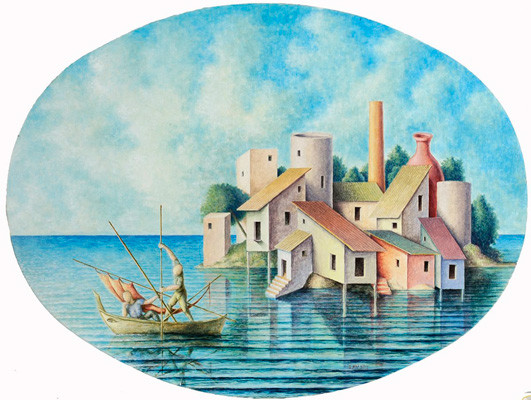Guillermo Pérez Villalta
23 Oct - 22 Nov 2012
GUILLERMO PÉREZ VILLALTA
2010 - 2012
23 October - 22 November 2012
SENSITIVITY THESE DAYS
Sensitivity is a word held in abeyance; I would even dare say that it has a negative connotation. If someone says today that a person or a thing is “sensitive”, they definitely mean that they have a fair amount of weakness. In a society where power has the most significant value, we would believe that this word has a negative meaning. But sensitivity is a sense like the others: taste, sight, etc., and moreover is the sense that contemplates the rest of the senses; it shapes all the information entering through them. Sensitivity lets us be aware of what we have in front of us. It gives us an emotional assessment of things; it provides us with a more profound relationship with things.
The Japanese word “Kokoro” could be translated into “The Heart of Things”, even though Japanese people refer to it as “The Soul”, or as something inner. To me, sensitivity is the place from where we contemplate “Kokoro”. With this sense we can see things in the profoundest of ways.
Sensitivity should be as educated and exercised as the rest of the senses, and from early ages. Through this training, we would undoubtedly turn this life and this world into better ones. Above all, art would be art.
Given the fact that our society follows an economic philosophy, it seems to be a waste of time. Unfortunately, the lack of sensitivity runs the world and, quoting my friend Javier Utray, “Most of the people only use their eyes to not encounter objects”.
This sense allows us to establish a relationship with things based upon emotion and affection. The loving relationship from which arouses one of the grand mysteries of human knowledge: that thing called beauty, that thing giving pleasure not only through the senses but also thanks to a complete consciousness of our being. Maybe it is just a door that opens a path to spirituality.
2010 - 2012
23 October - 22 November 2012
SENSITIVITY THESE DAYS
Sensitivity is a word held in abeyance; I would even dare say that it has a negative connotation. If someone says today that a person or a thing is “sensitive”, they definitely mean that they have a fair amount of weakness. In a society where power has the most significant value, we would believe that this word has a negative meaning. But sensitivity is a sense like the others: taste, sight, etc., and moreover is the sense that contemplates the rest of the senses; it shapes all the information entering through them. Sensitivity lets us be aware of what we have in front of us. It gives us an emotional assessment of things; it provides us with a more profound relationship with things.
The Japanese word “Kokoro” could be translated into “The Heart of Things”, even though Japanese people refer to it as “The Soul”, or as something inner. To me, sensitivity is the place from where we contemplate “Kokoro”. With this sense we can see things in the profoundest of ways.
Sensitivity should be as educated and exercised as the rest of the senses, and from early ages. Through this training, we would undoubtedly turn this life and this world into better ones. Above all, art would be art.
Given the fact that our society follows an economic philosophy, it seems to be a waste of time. Unfortunately, the lack of sensitivity runs the world and, quoting my friend Javier Utray, “Most of the people only use their eyes to not encounter objects”.
This sense allows us to establish a relationship with things based upon emotion and affection. The loving relationship from which arouses one of the grand mysteries of human knowledge: that thing called beauty, that thing giving pleasure not only through the senses but also thanks to a complete consciousness of our being. Maybe it is just a door that opens a path to spirituality.

